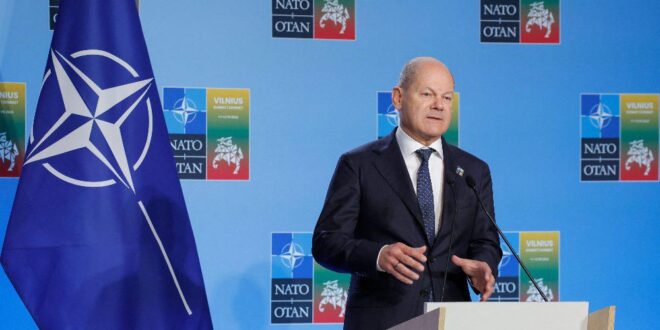Russia’s invasion of Ukraine has hardly changed the foreign-policy mindset in Berlin. Only a robust, long-term containment strategy can help the West curb Russia’s expansionist ambitions.
Has Russia’s war against Ukraine fundamentally changed the thinking of policymakers in Berlin? Have they really understood that in the future European security must be framed against an aggressive Russia? And that Germany must strengthen its own resilience and defenses across the board because it is in the crosshairs of Russian great-power dreams?
The short answer is no. To be sure, the traffic-light coalition government periodically uses Zeitenwende rhetoric and assiduously lists Germany’s support measures for Ukraine. But it all sounds like a fulfilment of duty. It has little to do with a new strategic beginning.
Certainly, there are voices of individual members of the Bundestag who are doggedly trying to wring the release of Taurus cruise missiles from the chancellor’s office, just like the German battle tanks before them—or, before that, air-defense systems.
But the Kiesewetters and Strack-Zimmermanns (Christian Democrat member of the Foreign Affairs Committee and Free Democrats chairwoman of the Defense Committee, respectively) of this world are lonely voices in the German foreign policy scene. The vast majority of Bundestag members remain silent in the public debate on how Europe should deal with an expansionist Russia that holds its neighbors to nuclear blackmail and spares no war crimes.
The blame for this lack of strategy lies primarily with Chancellor Olaf Scholz and his Social Democratic Party (SPD) loyalists. Since the beginning of the war, they have never tired of talking the talk of fear of military escalation. We must maintain control of the escalation, they say, and keep Germany out of the war.
But what escalation control? As if the German government could stop the Kremlin for even a moment from wantonly flooding the Kakhovka dam, continuing to target its deadly drones on defenseless Ukrainians, or thwarting civilian shipping in the Black Sea.
No, this German attitude does not deter Vladimir Putin’s regime from continuing its brutal campaign of destruction against Ukraine, turning Belarus into a nuclear outpost of Moscow, and extending its toxic influence to Moldova, Georgia, and the Balkans.
The opposite is the case: The fact that the SPD leadership continues to advocate for peace talks and that Putin has ideological comrades-in-arms in Germany’s far-right Alternative for Germany (AfD) party, which transmits unfiltered Russian propaganda to large sections of the German public, can only benefit the Kremlin.
Scholz does not want to be the one to let Ukraine fall, but neither does he want to be the one to bring Russia to its knees. In short, there is no clear positioning with regard to Moscow. And, more importantly, he does not offer an answer to the most important question: How can Russia, which is aggressive and relies on nuclear blackmail, be permanently put in its place and how can Ukraine be freed from this nightmare?
A dictatorial peace that leaves parts of Ukraine in Moscow’s hands must not be allowed to happen, says the chancellor. But how will he prevent that?
Would Scholz’s office be reluctant to see the Putin regime suffer an all-too-clear military defeat? The common argument is that such a scenario could result in dangerous domestic political turmoil that, in the worst case, would lead to an uncontrollable disintegration of Russia. Arguably, it would therefore be better to wait for a suitable window of opportunity for negotiations. Perhaps after Putin has reelected himself as Russian president on March 17, 2024? Next spring, the thinking goes, a Ukraine exhausted by two years of war might also be more willing to sit down at the negotiating table. Talks have to start sometime, don’t they?
Somewhere in between, Germany’s defense efforts also get stuck. Berlin has yet to deliver on the binding commitment to allies to spend at least 2 percent of GDP on defense.
At the NATO meeting in Vilnius, Scholz emphasized his government’s willingness to finally put Germany’s defense capabilities on a solid footing. The fact that the announced major structural and financial changes will not materialize has not escaped the attention of the allies. They will continue to puzzle over how the notoriously underfunded Bundeswehr is to improve its war-fighting capability and operational readiness while also fulfilling its alliance obligations.
If the Social Democrats are unable to recognize that the outcome of the war in Ukraine will decide more than the future affiliation of Crimea and the Donbas, then at least the other two traffic light coalition members—the Greens and Liberals—should set out to think outside the box of their electoral tactics.
Only with the help of a robust and long-term containment strategy can the West limit Russia’s expansive radius of action. A look at George Kennan’s Long Telegram from 1946 might provide some important food for thought on what a neo-containment strategy coordinated with NATO allies might look like.
In the United States, some big-name strategists such as former U.S. secretary of state Condoleezza Rice and historian Niall Ferguson, as well as former NATO deputy secretary general Alexander Vershbow, have already initiated the containment discussion.
Here in Germany, a modest start would be made if the Greens and Liberals, supported by the Christian Democrats, said loud and clear: Germany is no longer surrounded by friends. It has a veritable adversary in Russia, but it will do everything to defend the democratic order against it and actively help to defeat the regime in Moscow.
For Germany, European security does not end at the NATO borders.
 Eurasia Press & News
Eurasia Press & News




